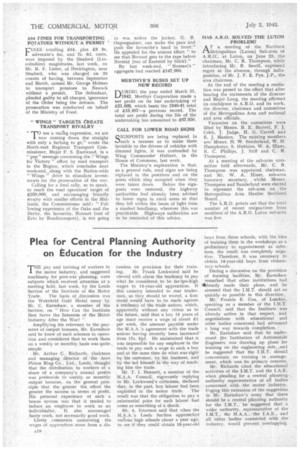Plea for Central Planning Authority on Education for the Industry '
Page 20

If you've noticed an error in this article please click here to report it so we can fix it.
THE pay and training of workers in the motor industry, and suggested machinery for post-war planning, were subjects which received attention at a meeting held, last week, by the Leeds Section of the Institute of the Motor
Trade. The basis of discussion was the Wakefield Gold dedal essay by Mr. C. Earnshaw, a member of the Section: on " How Can the Institute Best Serve the Interests of the Motor Industry After the War? "
Amplifying his reference to the payment of output bonuses, Mr. Earnshaw said he knew of such schemes in operation and considered that to work them on a weekly or monthly basis was quite, simple.
Mr. Arthur C. Richards, chairman and managing director of the Aero Piston Ring Co., Ltd., Leeds, thought that the distribution to workers of a share of a company's annual profits was preferable to weekly or monthly output bonuses, on the general principle that the greater the effort the greater the success in terms of profit. His personal experience of such a bonus system was that it tended to induce an employee to work as an individualist. It also encouraged hasty work, not necessarily good work.
Lively comments concerning the wages of apprentices arose from a dis
cussion on provision for their train ing. Mr. Frank Lockwood said he viewed with alarm the tendency to pay what he considered to be far-too-high wages to 14-year-old apprentices. If this country intended to rear tradesmen, as they should be reared, a firm stand would have to be made against a tendency of the trade unions, which, apparently without any vision as to the future, said that a boy 14 years of age must receive a wage of about £1 per week, the amount payable under the M,A.A.'s agreement with the trade unions having recently been increased' from 17s. 50. He maintained that it was impossible for any employer in the trade to pay such a wage to such a boy and at the same time do what was right by his customer, by his business, and by the lad himself in the way of teaching him the trade.
Mr. T. I. Bennett, a member of the M.A.A. Council, vigorously replying to Mr. Lockwood's criticisms, declared that, in the past, boy labour had been exploited in the motor trade. The result was that the obligation to pay a substantial price for such labour had come as something of a shock.
Mr. A. Ibbotson said that when the M.A.A.'s Leeds Section approached vailous high schools about a year ago; to see if they could obtain 16-year-old boys from those schools, with the idea of training them in the workshops as a preliminary to appointment as salesmen, the result was completely negative. Therefore, it was necessary to obtain 14-year-old boys from elementary schools.
During a discussion on the provision of training facilities, Mr. Earnshaw remarked that other institutions had "bilready made their plans, and he stressed that the I.M.T. should act as quickly as possible in this direction..
Mr. Francis E. Cox,_ of London, speaking as a member of the I.M.T. Council, said that the Institute was already active in that respect, and negotiations with educational and other bodies concerned had advanced a long way towards completion.
Mr. Earnshaw said that he understood the Institution of Automobile Engineers was drawing up plans for training on the engineering side, ,and he suggested that the I.M.T. should concentrate on training in management, which was its primary concern.
Mr. Richards cited the educational activities of the I.M.T. and the I.A.E. when pleading for a central planning authority representative of all bodies concerned with -the motor industry. Urging this extension of the suggestion in Mr. Earnshaw's essay that there should be a central planning authority for the I.M.T., he suggested that a wider authority, representative of the I.M.T., the M.A.A., the I.A.E., and all other bodies connected with the industry, would prevent overlapping.




















































